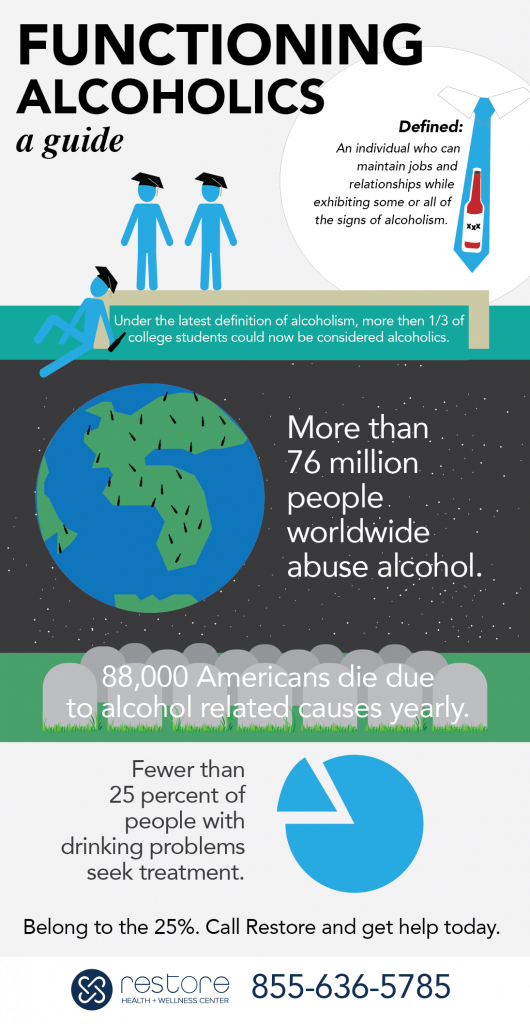
Experts believe that anywhere from 10-50% of alcoholics can be considered “high-functioning.”
There is some debate over the exact meaning of the term, but in most cases, it’s used to define an individual who can maintain jobs and relationships while exhibiting some or all of the signs of alcoholism.
The idea of the high-functioning alcoholic is different in many ways than the stereotypical idea of an alcoholic. When most people imagine an alcoholic, they usually envision an older man, often homeless or a bum, who has difficulty finding steady work and may not have many significant relationships. In contrast, high-functioning alcoholics are often men and women who are very successful at work and may even be in positions of power or authority. In many cases, these individuals dress well, stay in shape, have many friends, and by all outside appearances, have a happy family and personal life. However, on the inside, they may be suffering greatly.
In addition, it’s important to realize that it’s not only older professionals who may be at risk from high-functioning alcoholism. Young people, including college students, may also be at serious risk. According to new parameters that define alcoholism, more than one third, or around 37% of American college students could be considered alcoholics. While many might ‘grow out’ of this addiction, unfortunately, many will not. Unless they get quality alcohol addiction treatment, they too may suffer many of the consequences of alcoholism, regardless of their other life achievements.
High-Functioning Alcoholics Often Participate in Activities That Put Themselves and Others at Risk
A large amount of high-functioning individuals who suffer from alcoholism say that they act as if they were an entirely different person when
under the influence of alcohol. Unlike individuals who drink a somewhat large amount but may not be alcoholics, high-functioning alcoholics often engage in dangerous or risky behaviors, usually as a result of binge drinking. High-functioning alcoholics may drive under the influence of alcohol, engage in risky sexual behaviors, or commit violent acts while drinking. Worse, many high-functioning alcoholics regularly experience blackouts, meaning that they may not remember any of these dangerous activities the next day.
High-Functioning Alcoholics Often Reach a Breaking Point Before Seeking Help
Considering the fact that so many high-functioning alcoholics look as if they have their lives completely together, even to many of the people
closest to them, it can often take a serious wake-up call for them to seek treatment. This can come in the form of a DUI or other alcohol-related arrest, a serious act of violence committed while drinking, the loss of a job or business opportunity due to alcoholism, or a spouse or partner asking for a divorce or separation due to the individual’s alcohol problems.
High-Function Alcoholics Exhibit a Series of Behaviors Separate from Regular Drinkers
Unlike individuals who drink socially or casually, high-functioning alcoholics often develop a series of alcohol-related behaviors centered around cravings, dependence, binges, and secrecy. In particular, high-functioning individuals suffering from alcoholism may exhibit behaviors including:
- Secretly drinking before social events
- Hiding their alcohol use (or the exact amount of their alcohol use) from friends and family
- Cravings for alcohol during times of stress
- Experiencing obsessive thoughts about drinking
- Feeling as if they need alcohol to cope with certain situations or events
- Drinking alone or in the morning
- Drinking more to combat the effects of a serious hangover
- Experiencing a series of blackouts
Experts emphasize that it’s not necessarily the amount you drink that makes you an alcoholic; instead, it’s what happens when you’re drinking. Therefore, even someone who drinks relatively little may be suffering from alcoholism if they’re exhibiting one or more of the above behaviors.
Do The Three Stages Stages of Alcoholism Apply to High-Functioning Alcoholics?
Traditionally, the medical community defines alcoholism in three stages, each progressively worse. These stages may or not fully apply to high functioning alcoholics, because many of these individuals may not drink every day or be physically dependent on alcohol. However, some high-functioning alcoholics do drink every day and are physically dependent on the substance, and in these cases, the three stages certainly apply. In some cases, high-functioning individuals may simply be suffering from undiagnosed early or middle-stage alcoholism, because most late-stage alcoholics may not be able to function regularly in their careers or social lives.
The three stages of alcoholism include:
- Early-stage alcoholism: is characterized by an individual attempting to use alcohol to regulate their emotions and deal with life stressors. During this stage, they often begin to think about alcohol more regularly. In many cases, individuals may actually look as if they are functioning better under the influence of alcohol, as their body has somewhat adapted to the substance, but in reality, the alcohol is causing increasing amounts of physical and mental damage to them.
- Middle-stage alcoholism: is characterized by individuals drinking more and losing control over their drinking habits. This can manifest itself in the form of drinking at earlier times of day, such as in the morning, as well as regular alcohol-induced blackouts and memory loss. Stomach problems may worsen at this time, alcohol withdrawal becomes more noticeable, and individuals may begin to seem more intoxicated as their tolerance often actually decreases during this stage.
- Late-stage alcoholism: is characterized by an individual becoming completely obsessed with alcohol. Mental clarity is greatly reduced, and individuals may experience organ damage as well as increasing legal, financial, and emotional problems. Friendships and significant relationships may begin to significantly suffer– and it’s obvious to those around the individual that they are in need of serious help.
Research Online to Find More Resources for High-Functioning Alcoholics
Unfortunately, self-denial among many high-functioning individuals suffering from alcoholism has made it more difficult for these individuals to find high-quality treatment. Additionally, the fact that many in our society do not understand the idea that a person can have a successful job and productive friendships and relationships while suffering from an addiction to alcohol has only made it more challenging for individuals to get help.
These misconceptions are only furthered by a lack of education about the disease of alcoholism. However, there are a wide variety of educational resources available online that can help. These resources can assist anyone who believes they may be suffering from alcoholism, has a friend or family member who they believe is suffering, or simply wants to understand more about alcohol abuse and treatment. For example, the National Council on Alcoholism and Drug Dependence (NCADD) a non-profit organization committed to studying and preventing substance abuse, has created an online quiz that may be able to help you determine if your alcohol use is within safe levels.
While none of these resources is as comprehensive (or as important) as visiting a doctor or a professional addiction specialist, online learning can still play an important role in keeping you informed about the role of alcohol in your life and the lives of those you care about.
At Restore Health and Wellness Center, We Provide Comprehensive Alcohol Addiction Treatment
Just because you or someone you love is successful and has a variety of successful friendships and relationships does not mean that they cannot suffer from the disease of alcoholism. For anyone who suffers from this disorder, finding high-quality alcohol addiction treatment is a must. Getting a treatment can change an individual’s life in every way. It can improve their friendships, relationships, and physical, mental, and emotional health in many ways.
At Restore Alcohol Treatment Center, we’re committed to helping individuals live a life free of alcohol and drugs. We do this by giving each patient the tools to learn more about themselves and cope with their stressors in a healthy way, without turning to dangerous and addictive substances.
At Restore, we help patients through every stage of alcohol rehabilitation, from detox all the way through to aftercare services and alumni support. If you’re looking for a caring alcohol abuse treatment program that can truly revolutionize your life, look no further than Restore Health and Wellness Center. Visit our alcohol rehab center in Calabasas, CA at 6918 Owensmouth Ave Canoga Park, CA 91303. 24/7 Admissions (818) 722-9019. On-Site Contact (818) 806-3914.
Don't wait any longer!
Sources:




